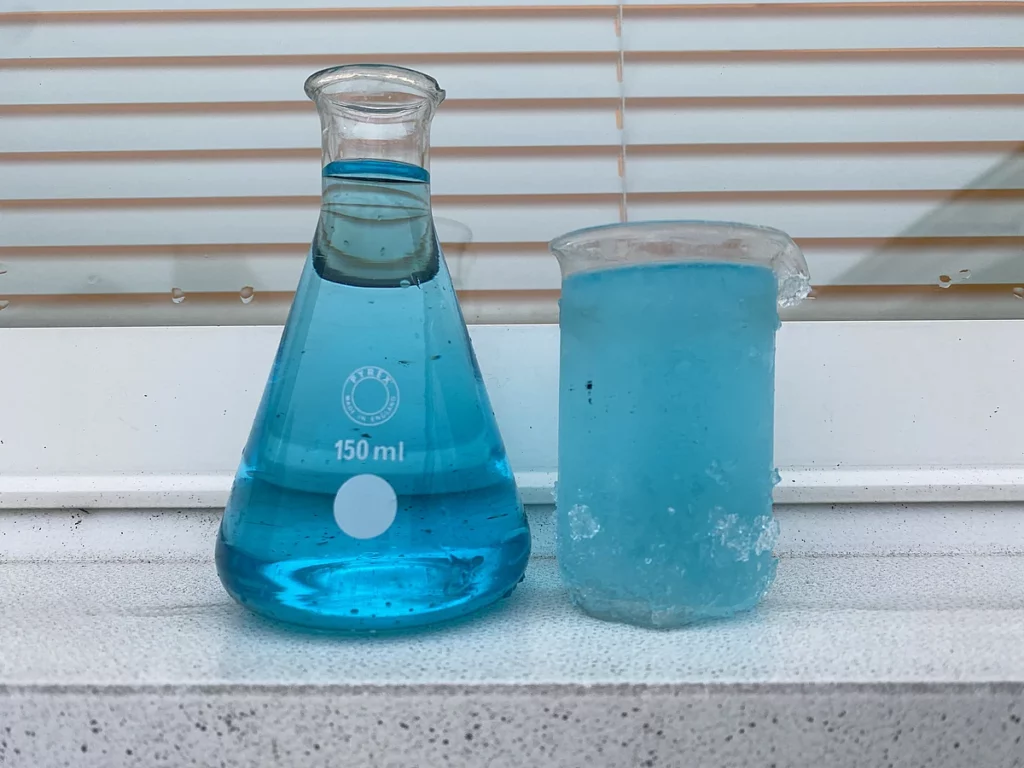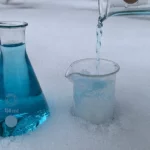If you are a new RV owner – or new to owning RVs and parts of the country that get really cold weather during the winter – the odds are pretty good you’ve been surprised about the behavior of your RV antifreeze when the mercury drops.
After all, with a thing called antifreeze right there in the name you wouldn’t necessarily expect it to (you know) freeze in the first place!
Truth be told, though, that’s exactly what can happen when RV antifreeze is exposed to temperatures that are really, really cold. Antifreeze can freeze rock solid on you.
We are talking about -50°F to -100°F, though – temperatures that are (thankfully) pretty uncommon to encounter in the Lower 48 and even areas in Alaska.
At the same time, there is always the potential for your RV antifreeze to start to get a little slushy and to ice up on you. That happens at lower temperatures (like 20°F and below).

You’ll want to know how to treat these situations, how to make sure that your RV plumbing system is good to go, and how to avoid these kinds of problems in the future.
That’s why we put together this detailed guide.
Can My RV Antifreeze Freeze Itself?
Right out of the gate you should know that antifreeze (even though it’s called antifreeze) actually can start to ice up and get a little slushy.
The specific grade and specific type of antifreeze that you are working with will get this way at different temperatures, but for the most part you’ll start to see things ice up in your plumbing system when the temperatures hit 20°F.
You probably won’t see RV antifreeze really start to freeze into a solid (or even a semisolid) until you start getting down to temperatures like -30°F, -40°F, and -50°F.
As soon as you get down that low on the thermometer, though, you can expect a freeze up to happen – and that’s going to cause a lot of havoc internally throughout the plumbing system of your RV.
It’s not at all uncommon for frozen RV antifreeze to bust pipes the same way that frozen water in a home’s pipes well. That rapid expansion is going to (at the very least) wreak havoc on pipe fittings and pipe connections, even if the plumbing system itself still looks completely intact.
If your RV antifreeze freezes up there’s going to be a lot of work to be done and a lot of leaks to chase!
I’ve Got “Slushy” Antifreeze in My RV – What’s That All About?
As we mentioned a moment ago, RV antifreeze starts to get a little bit slushy when you see temperatures of about 20°F for an extended amount of time.
Some people are unaware of the fact that antifreeze is a mixture of two or more different fluids, one of them water – and it’s the water in the antifreeze that’s going to start to get slushy as the temperature drops.
Because of the other chemicals in the antifreeze formula, though, that water isn’t going to be able to create a solid frozen structure the way that it would if it was 100% water.
Instead, you end up with this kind of crystalline structure that is sort of hard and soft at the same time, a “crunchy” kind of slush that isn’t going to damage your plumbing system – though it isn’t going to race through your pipes quite as fluidly as it would have in warmer weather, either.
The good news is that as temperatures warm up those crystalline structures are going to break down, the slush is going to melt, and the water that had frozen in the antifreeze is going to be released back into the rest of the chemical concoction.
You’re not necessarily going to have to flush your system if you’re dealing with a slushy or gel like antifreeze most of the time.
Is There a Real Difference Between RV Antifreeze and Auto Antifreeze?
One of the reasons that RV antifreeze freezes up is because its chemical composition is different than traditional automotive antifreeze.
Automotive antifreeze, for example, is pretty much as shelfstable a product as it gets. As long as it stays sealed up it is “good to go” definitely – it literally will not expire and will not break down.
On top of that, automotive antifreeze is a much more dense product because it has a lot more ethylene glycol in it. This makes automotive antifreeze incredibly toxic and poisonous for people and pets, but it all but guarantees that you won’t have to worry about automotive antifreeze freezing up anytime soon.
RV antifreeze, on the other hand, is a lot less shelfstable, a lot less toxic, and a lot “thinner” than automotive antifreeze.
That’s because this kind of antifreeze has to run through the entirety of your RV plumbing system and is likely going to be subjected to much colder temperatures for extended amounts of time versus your daily driver that get started, heated up, and run on a regular basis.
What’s the Best RV Antifreeze I Can Use?
There are different kinds of antifreeze available, and the owner manual for your RV will tell you exactly what kind of antifreeze you’ll want to use for that specific make and model.
Here’s a quick rundown of the three most popular types of RV antifreeze available today, though:
Ethanol Antifreeze
Ethanol antifreeze takes advantage of ethanol alcohol to prevent your system from freezing.
This kind of antifreeze is fantastic for RVs that are going to be spending a lot of time in cold temperatures (especially below freezing), but there are some drawbacks as well.
One of these drawbacks is that this form of antifreeze is incredibly flammable compared to other options. Alcohol has a notorious reputation for being quick to ignite and this antifreeze is no different.
On top of that, this antifreeze also can try out the rubber seals and gaskets throughout your plumbing system. That’s something to consider!
Propylene Glycol Antifreeze
The big advantage here is that propylene glycol antifreeze is nowhere near as toxic or as dangerous as some of the other options out there.
Another big bonus for using this kind of RV antifreeze is that it is going to provide lubrication to your plumbing gaskets and seals. You’ll be able to extend the lifetime of your RV plumbing system with this antifreeze.
On the downside, though, is the cost of this concoction.
Because of its myriad of benefits (because of the propylene glycol used in the chemical composition) this antifreeze is pretty expensive. We’re not just talking about a couple of pennies more per jug of antifreeze, either. We’re talking a couple of dollars more per jug.
Ethanol and Propylene Glycol Blends
This is a relatively new options available on the market today, combining the best of all worlds while mitigating the drawbacks that both of these products alone bring to the table.
Still a little toxic (because of the ethanol) but much better at protecting plumbing system components, if you don’t want to spend a small fortune on propylene glycol antifreeze alone but one many of the same benefits, this is the way to go.








